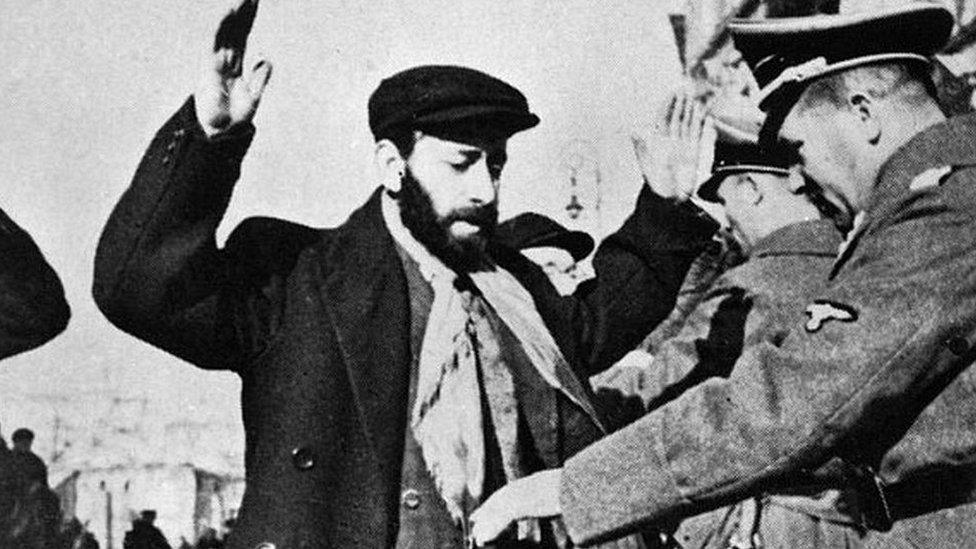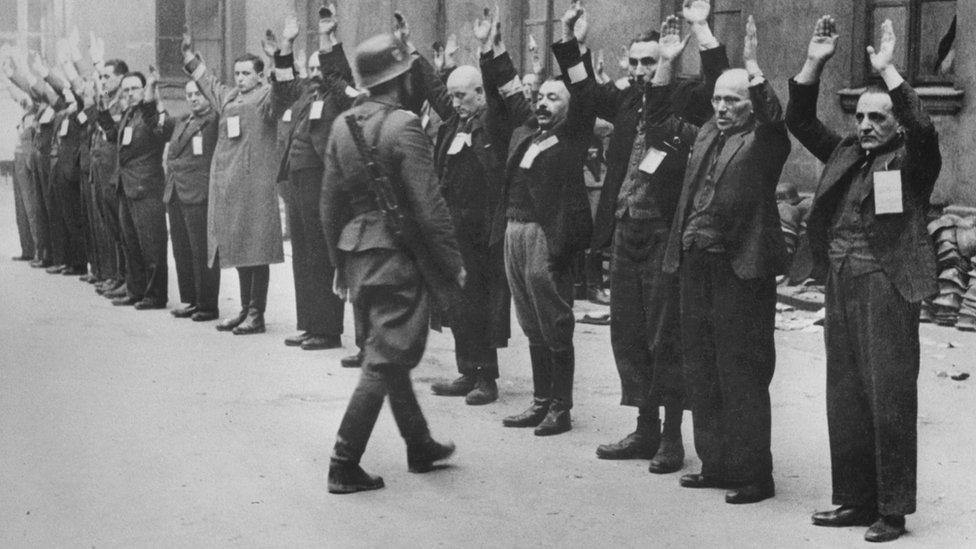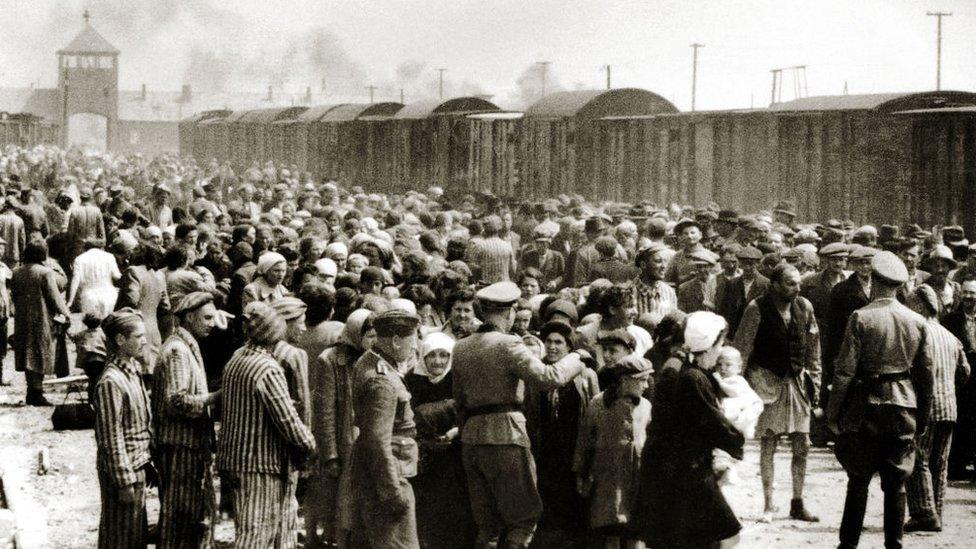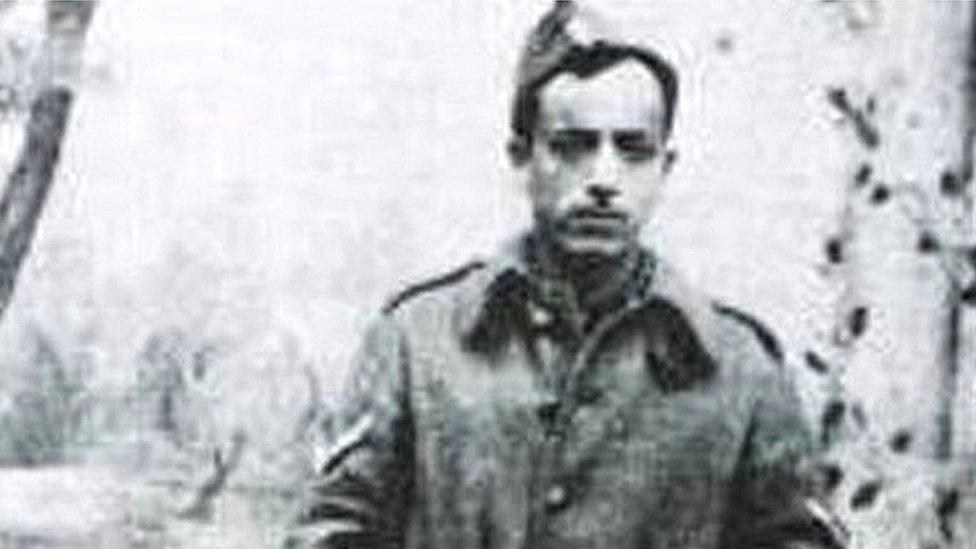Polish court tells two Holocaust historians to apologise
- Published

German SS searching Jews in Warsaw in 1939
A Polish court has ordered two Holocaust historians to apologise to the niece of a dead village mayor, for having accused him of collaborating with the Nazis in World War Two.
Despite finding them guilty of defamation in a book, the Warsaw court did not order them to pay damages.
The World Holocaust Remembrance Centre, Yad Vashem, called the case "a serious attack on free and open research".
Professors Barbara Engelking and Jan Grabowski can appeal.
It was a civil case brought against them by 80-year-old Filomena Leszczynska.
About six million Jews died in the Holocaust, half of them Polish Jews. Some 90% of Poland's pre-war Jewish community were killed.
The book Night Without End quoted testimony from a Holocaust survivor who said the mayor, Edward Malinowski, had betrayed the whereabouts of a group of 22 Jews to German soldiers. The group was subsequently executed.
Ms Leszczynska said the authors had omitted to say a post-war trial had acquitted her uncle of the charge of collaboration with the Nazis.
Poles constitute the largest national group honoured by Yad Vashem as Righteous Among the Nations, for having helped save Jews from the occupying German Nazis' anti-Semitic extermination campaign. It honours 7,112 Poles, external, estimating that they saved about 35,000 Jews.
Despite their heroism, Yad Vashem says historical research shows that such help "was relatively rare, and attacks against and even the murder of Jews were widespread phenomena".
More than five million Polish citizens in total died in the war.
A controversial 2018 law in Poland makes it an offence to link the Polish nation to Nazi crimes. It was not invoked however in the present case.
Witness: Memories of the Warsaw Ghetto

The niece is backed by an organisation called the Polish League Against Defamation, which aims to defend "Poland's good name". She demanded 100,000 zloty (£19,600; $27,000) in damages and a formal apology in the media.
The League is close to the ruling nationalist Law and Justice Party (PiS), which champions traditional Polish Catholic values.

Case reopens scars of brutal occupation

For critics of this trial, the issue here is not the complainant's right to defend the good name of her uncle. It's about how history is portrayed and how academics should be free to research that history.
The issue of Polish-Jewish relations during the war is notoriously complex. The Germans introduced a brutal occupation and encouraged Poles to betray their Jewish neighbours. In more than 1,600 pages, the book tries to quantify how many Poles in north-eastern Poland were complicit in the Nazi-led Holocaust of the Jews.
The government admits individual Poles committed crimes against Polish Jews, but it prefers historians to focus on the fact that Poland was, first and foremost, a victim of the Nazis.
It is rightly proud that more Poles than any other nationality are honoured in Israel for saving the lives of Jews. And those extraordinarily brave individuals did so despite knowing the Nazis would summarily shoot dead whole families, or more, for aiding Jews.
While this is a civil trial brought by a private individual, critics see it as further evidence of the governing coalition's attempts to whitewash history and produce a chilling effect that would discourage scholars from carrying out independent Holocaust research.
The niece's case has been financially supported by an NGO that has received substantial state support from taxpayers' money, although it says it has only used private donations.
Both academics have also been the victims of a campaign to discredit them by a state institute and the government-controlled public media.

League head Maciej Swirski, quoted by the AFP news agency, said the two historians had made mistakes harmful "to all Poles".
He criticised "attempts at establishing an academic consensus on Polish co-responsibility for the Holocaust".
Prof Engelking has condemned the lawsuit as "very dangerous for freedom of speech".
And Poland's chief rabbi, Michael Schudrich, told the BBC the lawsuit was an attempt at "intimidation" of researchers.
Related topics
- Published3 February 2018

- Published27 January

- Published1 December 2017
